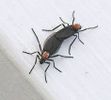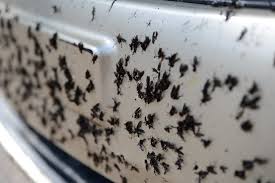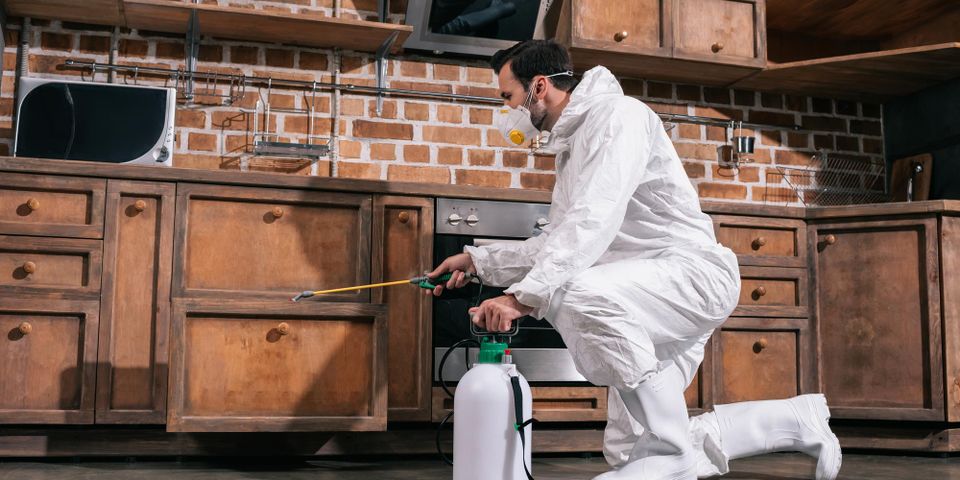”LOVEBUGS”

Also known as honeymoon flies, double-headed or kissing bugs, lovebugs are a species of small march flies that have a black velvety body with a red thorax. The insects are named so due to their habit of remaining coupled for several days during and after mating, even while flying. These insects are usually found in Central and Southeastern United States, especially in Florida, Texas, Louisiana, and Alabama. During the spring and summer months, and occasionally in fall and winter, they come out in immense swarms, causing a nuisance wherever they go.
Lovebugs don't bite, sting, or cause any damage to crops and household plants. In fact, they are an important part of the ecosystem, because their larvae feed on dead and decomposing animal and plant matter, and act as a natural recycling system. However, due to their large numbers, they are a nuisance to anyone who is uncomfortable with insects. Also, vehicles driving at a high speed are likely to a lot of luvebugs smashed onto their hood and windshield, causing vision problems, increasing the risk of accidents. Dead lovebugs are highly acidic, which means that they are difficult to wash off from automobiles, and often cause paint damage. Another major concern is the clogging up of the radiator pipes, which can cause the automobile engine to overheat. Although it is not possible to completely eliminate these issues, following the tips and home remedies given below can reduce the severity of the problem to a great extent.
How to Get Rid of Lovebugs Around the House
- The most effective step in deterring lovebugs from entering your yard is to mow the lawn regularly, and to remove all the dead or decomposing biological matter like leaves and cut grass from the area. This is because lovebug larvae prefer to eat dead leaves and other such debris, making it an ideal spot for the flying adults to lay their eggs in.
- Adult lovebugs are attracted to the fumes coming from cars, lawn mowers, and other such machines. Hence, it is not advisable to leave the vehicles or equipment idling in the yard.
- These insects are attracted to bright colors, so painting the walls of your home in dark shades can help. However, make sure that this paint job is not done during swarming season, as they are attracted to the smell of fresh paint.
- In case you find your yard and home swarmed by these insects, an effective but temporary solution is to wash them off from the walls, with water or a soap solution. These insects don't swarm on wet surfaces.
- Another temporary solution is to blow the bugs away from your area using a powerful electric blower.
- Spraying the doors and windows of your home with a insect spray can help in keeping the bugs out.
- Lovebugs dislike citrus smells, so lighting citrus-scented mosquito repellent candles, or using a citrus soap solution mixed with some mouth wash as a spray can keep the insects away for a while.
- If the bugs have entered the house, use a vacuum cleaner to catch them and discard them in a bag. It is a good idea to spray the citrus solution on the insects in the bag, before you throw them away.
- You can kill the lovebugs with a mosquito repellent coil, or by just stamping on them. Just make sure that the area is stain proof before you smash them. Also, make sure that you wear clothes that cover your body well while doing so.
- During swarming season, it is advised that you wear dark-colored clothes.
- If you need to host a event or party outdoors, it is a good idea to hold the event after sundown, as these bugs are active only during the day.
- Use a bug zapper, i.e., a hand-held, battery-powered, tennis racquet-shaped, electric pest control device to kill any lovebugs that enter in the house.
- Water your lawn to a minimum, it makes the area difficult to maintain, and provides an opportunity for the lovebugs to lay their eggs.
- Apply insect repellent on your face and skin to keep the lovebugs away from you.
- As a last resort, you can use some chemical insecticides, to kill the love bugs, but ensure that you do not use too much, as it is dangerous for humans and animals.
- Lastly, open and close doors quickly while entering or exiting your home, to prevent the bugs from sneaking inside.
How to Remove Lovebugs From Your Car

- Try to keep all your driving to after sundown, when lovebugs are not active and flying around.
- Drive your car at low speeds, to avoid the bugs from smashing into your hood and windshield.
- The remains of dead lovebugs can be tough to wash off if not removed soon enough.
- Waxing your car before swarming season, will make it easy to wash off the dead bugs from the car.
- You could wipe the car with cooking spray to reduce the stickiness of the dead bugs' bodies. However, be sure that the car's paint is resistant to such materials, because the paint on some automobiles, can get damaged by the spray.
- Use a car mask during swarming season, dead lovebugs will splatter on the mask, rather than on your car.
- Wiper fluids specially formulated for the lovebug problem are available in many stores. These fluids don't allow the bugs to stick to the windshield, preventing damage.
- Using a filter screen in front of your car grill, will prevent lovebugs from getting into your radiator.
- While cleaning, you can wipe the car with baby oil to remove the bugs more easily.
- Soap and water solutions can also effectively remove the dead bugs with some effort and when done early.
- Use a wet cloth dipped in baking soda to get lovebugs off your paintwork easily.
- WD-40 is another very effective product while trying to clean these dead insects.
- Wiping the car with wet dryer sheets also helps in getting the bugs off the car. However, one must be gentle while doing this, as excess force may cause scratches on the paintwork.
- As mentioned before, lovebugs love bright colors, so if you are planning to buy a car, choose a dark-colored one. It will attract lesser insects.
- Soaking the dead bugs in the cleaning solution, will make the process easier.
- A solution of warm water and baby shampoo is another good option for cleaning dead lovebugs off your car.
- Vinegar and water solution is an effective home remedy for cleaning.
- Installing wind deflectors on your car will prevent most lovebugs from hitting the windshield.
The tips and home remedies given above, will surely make a difference, and save you a lot of time and money for cleaning or repairing your home and vehicle. However, if you still have problems with these little pests, remember that lovebug season lasts for only a few weeks. So wait for these blighters to die out, and then you can start your cleaning.
If you have any lawn or pest control problems please call GreenTec Pest Control at (727) 847-6733.
Need extra service between visits to correct a problem? Call us, your need for extra help is free!
If you like our service, please give us a five star rating ★★★★★
- ‘Google’ GreenTec Pest Control, Inc.
- View the display box to the right and be sure that the address says, 8610 Oreto Dr. Port Richey, FL 34668. There is more than one company in the area using our name,
- Scroll down and click on ‘Write a review’
- Click on each of the five stars ★★★★★
- Then click on ‘Share details of your own experience at this place’ and start writing.
Thanks very much, we appreciate your business and the trust that you place in us.
Sincerely,
Michael J. McCarthy
About the Business
Have a question? Ask the experts!
Send your question


